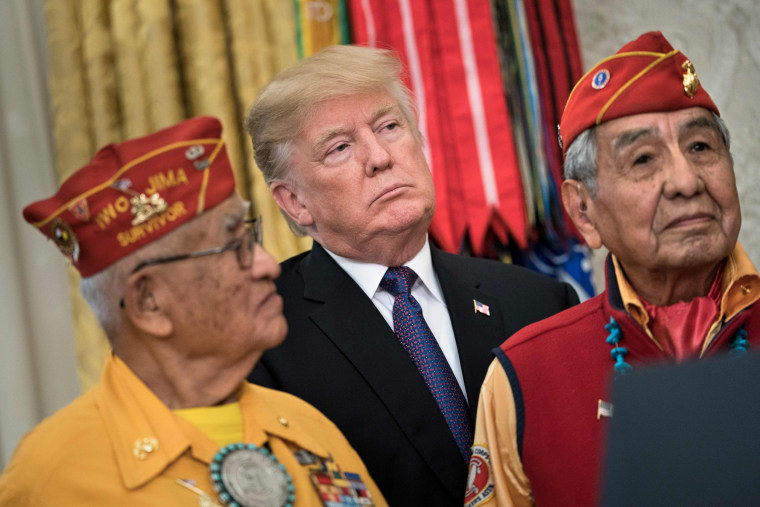President Donald Trump revived his derogatory nickname for Sen. Elizabeth Warren, D-Mass., on Monday, referring to her as "Pocahontas" during an event honoring Native American veterans at the White House.
Trump told the veterans: "You were here long before any of us were here. Although we have a representative in Congress who they say was here a long time ago. They call her Pocahontas."
After making the crack, Trump turned to one of the Navajo code talkers, who served in World War II, and said: "But you know what? I like you. Because you are special. You are special people, you are really incredible people."
He spoke under the watchful eye of a portrait of President Andrew Jackson, known for his forceful removals of Native Americans from their ancestral lands.
Moments later, Warren fired back.
"Donald Trump does this over and over thinking somehow he's going to shut me up with it," Warren said on MSNBC.
"It is deeply unfortunate that the president of the United States cannot even make it through a ceremony honoring these heroes without having to throw out a racial slur," she added.
The president began using the "Pocahontas" slur to attack Warren during the 2016 campaign, with some of Trump's crowds even mimicking Native American war cries. As president, Trump has kept it up, using his nickname for Warren during a speech in April at the National Rifle Association as well as more recently on Twitter.
Warren is currently at odds with the administration over Trump's appointment of his Office of Management and Budget director to be acting director of the Consumer Financial Protection Bureau.
John Norwood, general secretary of the Alliance of Colonial Era Tribes, said Trump's nickname for Warren "smacks of racism."
“The reference is using a historic American Indian figure as a derogatory insult and that’s insulting to all American Indians,” Norwood said, noting that it was particularly bad in context of the event.
He added that the president should “stop using our historical people of significance as a racial slur against one of his opponents.”
The National Congress of American Indians, the largest and most recognizable umbrella group for Native American tribes also criticized Trump's remarks at the event honoring "code talkers" — Native Americans recruited by the Marines as communications specialists during World War II.
"We regret that the president’s use of the name Pocahontas as a slur to insult a political adversary is overshadowing the true purpose of today’s White House ceremony,” NCAI President Jefferson Keel, himself a Vietnam combat veteran, said in a statement. “Today was about recognizing the remarkable courage and invaluable contributions of our Native code talkers.
But the White House said it was "ridiculous" to consider Trump's "Pocahontas" jab a racial slur. Instead, White House Press Secretary Sarah Huckabee Sanders said, "What most people find offensive is Senator Warren lying about her heritage to advance her career."
Warren has said she is proud of her heritage, citing "family stories" in defense of her claim of Native American ancestry, though she has never produced documentation.
Navajo Nation President Russell Begaye said in a statement that he wouldn't be taking sides in the spat between Trump and Warren.
"It was our code talkers that ensured the freedom of the United States and that's what's important to remember here," Begaye said.
In an interview with NBC News, Begaye described the president as "very cordial and very nice to recognize the Navajo."

